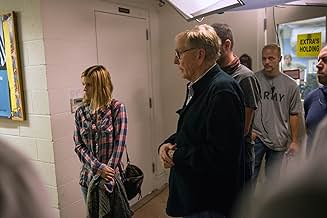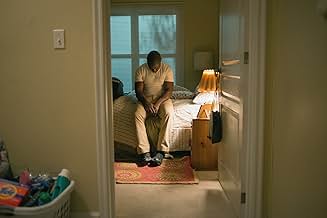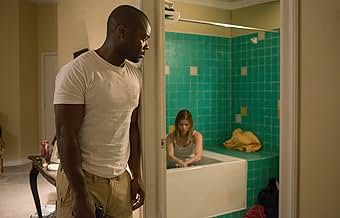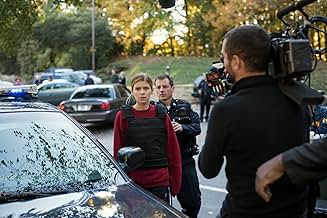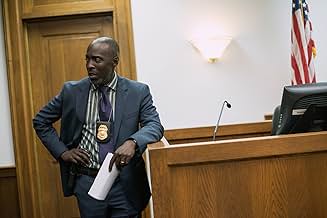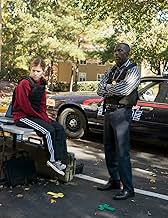VALUTAZIONE IMDb
5,4/10
7410
LA TUA VALUTAZIONE
Aggiungi una trama nella tua linguaA single mother struggling with drug addiction is taken hostage in her own apartment by a man on the run who has broken out of jail and murdered the judge assigned to his case.A single mother struggling with drug addiction is taken hostage in her own apartment by a man on the run who has broken out of jail and murdered the judge assigned to his case.A single mother struggling with drug addiction is taken hostage in her own apartment by a man on the run who has broken out of jail and murdered the judge assigned to his case.
- Regia
- Sceneggiatura
- Star
- Premi
- 3 candidature totali
Michael Kenneth Williams
- Lt. John Chestnut
- (as Michael K. Williams)
Leon Pridgen
- Squad Room Officer
- (as J. Leon Pridgen II)
Recensioni in evidenza
I've often said that every movie has a point of view and, whether you agree with that perspective or not, every film should be judged on how well it presents its story. It's difficult, therefore, for audience members to take a movie seriously when it's obviously "reaching" in its efforts to back up its point of view, and then sends mixed messages along the way. The drama "Captive" (PG-13, 1:37) has problems that should be obvious to the average Movie Fan before he or she even enters the theater. First of all, the simple but vague title has been used previously by at least six other movies, with greatly varied plots. (How can you hope to distinguish your movie and its supposedly unique message by choosing an oft-used and fairly meaningless title?) Secondly, when basing a movie on a true story which assumes an unprovable connection between events, you've chosen a story which will be difficult to make into a compelling feature film. (More on that later.) Thirdly, when your movie obviously wants the audience to think one way about certain characters and incidents, but then shows the audience just the opposite, it's tough to get any clear message across. (Another point to be expanded upon later in this review.) This film is based on the book "Unlikely Angel" written by Ashley Smith about the seven hours that she was held captive by an escaped prisoner. Brian Nichols (David Oyelowo) grew up in a middle-class family, had a God-fearing mother and attended college. He played college football and held down a couple decent jobs, but something went wrong somewhere along the way. He's about to go on trial for rape when he brutally beats a female guard and steals her gun and police radio. While escaping from Atlanta's Fulton County Courthouse and later trying to avoid detection, Nichols kills four people. Looking for a place to lay low for a while, he comes upon Ashley Smith (Kate Mara) smoking a cigarette outside her suburban Atlanta apartment. At gunpoint, he forces her back inside her otherwise empty residence.
Ashley Smith was a young woman who hadn't killed people, but had messed up her life in other ways. She was addicted to meth, a habit which had cost her her husband, who had been stabbed to death by a drug dealer, and her daughter, Paige (Elle Graham), who the courts had taken away from Smith and who was living with Smith's Aunt Kim (Mimi Rogers). Ashley obviously loves her daughter very much and is trying to get her life together so Paige can return to living with her, but she's having trouble staying on the straight and narrow. We see Ashley at a Celebrate Recovery meeting (an addiction rehabilitation program sponsored by evangelical Christian churches around the country), but it's mentioned that this was her first meeting in a while. One of the group's leaders tries to give Ashley a copy of Pastor Rick Warren's best-seller "A Purpose-Driven Life", but Ashley throws the book in the trash. (The woman retrieves the book and drops it off at the restaurant where Ashley works as a waitress.) Ashley continues doing meth and is high as she's unpacking her new apartment on the night that Nichols abducts her.
Over the next seven hours a strange bond develops between Nichols and Smith inside that apartment. She's initially as frightened as anyone in that situation would be, but she stays calm enough that Nichols doesn't perceive her as a threat. At first, he ties her up, but eventually he allows her to move about the apartment freely. He learns that she has drugs in the house and makes her share. Later, he forces her to help him ditch his truck. In spite of all this, as morning dawns, she makes him breakfast and the two of them talk. They commiserate over how they both feel misunderstood. When Nichols sees Smith idly thumbing through Warren's book, he asks her to read some of it to him. This happens several times during Smith's ordeal. At first, Nichols dismisses Warren's words as "a bunch of church crap", but, as the night wears on, he seems oddly calmed and even challenged by the short passages Smith reads aloud.
I won't take issue with the possible role of a higher power in this story, but rather with the way it's portrayed. It'll be clear to most discerning Movie Fans that Warren's book had little, if anything, to do with the way this story is resolved. Smith could have accomplished the same thing by reading to Nichols from her diary. It was her attitude and her approach that calmed Nichols down. Also, are we to overlook Nichols' crimes because they're shown with no blood and aren't repeated later in Smith's apartment? This is a decent home invasion story, but any suggestion that we should sympathize with a man who was unrepentant after murdering four innocent people is offensive, and the idea that a non-Christian drug addict diffused a potentially deadly situation by reading a few sentences from a book that happens to mention God is just silly. There can be little doubt that this experience changed Smith's life (how could it not?), but surviving such an experience would've changed the life of anyone regardless of her beliefs.
The main thing that makes "Captive" any better than an After School Special are solid performances by leads Oyelowo and Mara, as well as Rogers and Michael K. Williams (as the lead detective pursuing Nichols). Still, all these performances do is put a nice coat of gloss on a story that makes questionable assumptions, sends mixed messages and means little except to those directly involved. "C-"
Ashley Smith was a young woman who hadn't killed people, but had messed up her life in other ways. She was addicted to meth, a habit which had cost her her husband, who had been stabbed to death by a drug dealer, and her daughter, Paige (Elle Graham), who the courts had taken away from Smith and who was living with Smith's Aunt Kim (Mimi Rogers). Ashley obviously loves her daughter very much and is trying to get her life together so Paige can return to living with her, but she's having trouble staying on the straight and narrow. We see Ashley at a Celebrate Recovery meeting (an addiction rehabilitation program sponsored by evangelical Christian churches around the country), but it's mentioned that this was her first meeting in a while. One of the group's leaders tries to give Ashley a copy of Pastor Rick Warren's best-seller "A Purpose-Driven Life", but Ashley throws the book in the trash. (The woman retrieves the book and drops it off at the restaurant where Ashley works as a waitress.) Ashley continues doing meth and is high as she's unpacking her new apartment on the night that Nichols abducts her.
Over the next seven hours a strange bond develops between Nichols and Smith inside that apartment. She's initially as frightened as anyone in that situation would be, but she stays calm enough that Nichols doesn't perceive her as a threat. At first, he ties her up, but eventually he allows her to move about the apartment freely. He learns that she has drugs in the house and makes her share. Later, he forces her to help him ditch his truck. In spite of all this, as morning dawns, she makes him breakfast and the two of them talk. They commiserate over how they both feel misunderstood. When Nichols sees Smith idly thumbing through Warren's book, he asks her to read some of it to him. This happens several times during Smith's ordeal. At first, Nichols dismisses Warren's words as "a bunch of church crap", but, as the night wears on, he seems oddly calmed and even challenged by the short passages Smith reads aloud.
I won't take issue with the possible role of a higher power in this story, but rather with the way it's portrayed. It'll be clear to most discerning Movie Fans that Warren's book had little, if anything, to do with the way this story is resolved. Smith could have accomplished the same thing by reading to Nichols from her diary. It was her attitude and her approach that calmed Nichols down. Also, are we to overlook Nichols' crimes because they're shown with no blood and aren't repeated later in Smith's apartment? This is a decent home invasion story, but any suggestion that we should sympathize with a man who was unrepentant after murdering four innocent people is offensive, and the idea that a non-Christian drug addict diffused a potentially deadly situation by reading a few sentences from a book that happens to mention God is just silly. There can be little doubt that this experience changed Smith's life (how could it not?), but surviving such an experience would've changed the life of anyone regardless of her beliefs.
The main thing that makes "Captive" any better than an After School Special are solid performances by leads Oyelowo and Mara, as well as Rogers and Michael K. Williams (as the lead detective pursuing Nichols). Still, all these performances do is put a nice coat of gloss on a story that makes questionable assumptions, sends mixed messages and means little except to those directly involved. "C-"
On March 11, 2005, Brian Nichols, a man arrested for rape, escaped from the Fulton County courthouse in Atlanta, where he proceeded to kill four people and seek refuge in the home of a recovering crystal meth addict named Ashley Smith, where he held her hostage whilst he stayed clear of the law. During this time, Smith, who constantly feared for her life, with a young daughter living at her mother's home, used Rick Warren's book "The Purpose Driven Life" to help change Nichols's ways and become a man emancipated from the shackles of God's sin. Jerry Jameson's film "Captive" helps shed light on the events that took place whilst Smith was a prisoner in her own home, fearing for her life.
"Captive" is likely to get lumped under the category of a faith-based film, somewhat rightfully so, but in the end, it's a character piece at its core. It's a film that really emphasizes human imperfections and how certain situations can lead us down a path of perpetual wrongdoing, or sin, if we're not careful. A key scene in the film comes when Brian (played by David Oyelowo, who shocked with his tremendous portrayal of Dr. Martin Luther King, Jr. earlier in the year in the film "Selma") is holding Ashley's (Kate Mara, who was in last month's "Fantastic Four") head down into a plate of crystal meth, forcing her to take a line after making him take one himself. She refuses, even with a gun to the back of her head, and just as she weeps, thinking she's living the last few moments of her life, Brian loosens the grip on her neck and leaves her unharmed.
Ashley could've easily taken the meth; she would've probably felt the kind of high she long-desired and was trying to break free from this whole time. But something inside her told her to stop, to the point that she'd rather die from a bullet in her skull than from ingesting drugs to get her momentary fix. Brian is in the same position, in a situation not much more extreme than the one Ashley is currently in. He has a choice to either potentially carry on in his ostensibly endless pursuit of killing, carjacking, and destroying more lives than those he has killed, yet he parks at Ashley's house for a reason. She doesn't fight, she doesn't resist, but she simply adheres to his commands and hopes that some sort of positive outcome will come out of this situation.
This is a film made largely by the strength of its central performances. David Oyelowo plunges himself into a violent, unrelenting sociopath with unflinching conviction; the only thing his mean face and persona is missing is a pitbull-esque growl and snarl and he'd be the perfect cinematic murderer. Oyelowo's performance is terrific, and makes me assert that, in the next ten years, he will win an Oscar for one of his performances, supporting or leading (most likely leading); mark my words and place your bets.
Kate Mara shouldn't be ignored either, for she has an arguably more challenging role. Where Oyelowo's performance is largely predicated off of being menacing and violent, Mara's is one that's tender and vulnerable, heartbreakingly so. Put the two leading actors together and they create a strange, but viable chemistry for the film; one the film manages to sustain while it simultaneously forgoes its most important element - suspense. Despite the subject matter, this is a shockingly low-energy film, never rising to its ability to provide credible suspense nor capitalizing off of the inherent tension between its characters.
"Captive" is, above anything else, a film of perfectly played performances, and the fact it underplays its faith themes for more investing elements like character chemistry shows it's intelligence. This is, above all, a human film, about human experiences and shortcomings, and despite the lacking of real suspense, especially with the film's ending, since the buildup largely falls flat, this is a stunningly mature faith-based film, lacking any real sermonizing or guilt in the face of portraying something that will hold up longer than the aforementioned qualities every would.
"Captive" is likely to get lumped under the category of a faith-based film, somewhat rightfully so, but in the end, it's a character piece at its core. It's a film that really emphasizes human imperfections and how certain situations can lead us down a path of perpetual wrongdoing, or sin, if we're not careful. A key scene in the film comes when Brian (played by David Oyelowo, who shocked with his tremendous portrayal of Dr. Martin Luther King, Jr. earlier in the year in the film "Selma") is holding Ashley's (Kate Mara, who was in last month's "Fantastic Four") head down into a plate of crystal meth, forcing her to take a line after making him take one himself. She refuses, even with a gun to the back of her head, and just as she weeps, thinking she's living the last few moments of her life, Brian loosens the grip on her neck and leaves her unharmed.
Ashley could've easily taken the meth; she would've probably felt the kind of high she long-desired and was trying to break free from this whole time. But something inside her told her to stop, to the point that she'd rather die from a bullet in her skull than from ingesting drugs to get her momentary fix. Brian is in the same position, in a situation not much more extreme than the one Ashley is currently in. He has a choice to either potentially carry on in his ostensibly endless pursuit of killing, carjacking, and destroying more lives than those he has killed, yet he parks at Ashley's house for a reason. She doesn't fight, she doesn't resist, but she simply adheres to his commands and hopes that some sort of positive outcome will come out of this situation.
This is a film made largely by the strength of its central performances. David Oyelowo plunges himself into a violent, unrelenting sociopath with unflinching conviction; the only thing his mean face and persona is missing is a pitbull-esque growl and snarl and he'd be the perfect cinematic murderer. Oyelowo's performance is terrific, and makes me assert that, in the next ten years, he will win an Oscar for one of his performances, supporting or leading (most likely leading); mark my words and place your bets.
Kate Mara shouldn't be ignored either, for she has an arguably more challenging role. Where Oyelowo's performance is largely predicated off of being menacing and violent, Mara's is one that's tender and vulnerable, heartbreakingly so. Put the two leading actors together and they create a strange, but viable chemistry for the film; one the film manages to sustain while it simultaneously forgoes its most important element - suspense. Despite the subject matter, this is a shockingly low-energy film, never rising to its ability to provide credible suspense nor capitalizing off of the inherent tension between its characters.
"Captive" is, above anything else, a film of perfectly played performances, and the fact it underplays its faith themes for more investing elements like character chemistry shows it's intelligence. This is, above all, a human film, about human experiences and shortcomings, and despite the lacking of real suspense, especially with the film's ending, since the buildup largely falls flat, this is a stunningly mature faith-based film, lacking any real sermonizing or guilt in the face of portraying something that will hold up longer than the aforementioned qualities every would.
I saw this film without knowing anything about Brian Nichols and his story and I enjoyed it. I then saw the low ratings and mixed reviews and i wondered why. I'd classify it as drama/thriller: the tension is present throughout the movie but the main feature is the development of the two leading characters. David Oyelowo's acting is solid but it's above all Kate Mara's performance that strikes the viewer with her portrait of a troubled woman trying to make sense of her life. The interaction between the two, ranging from violent to almost tender, is another leitmotif. I guess knowing the ending takes away a lot of the suspense making it predictable hence my summary line. All cast is up to the task and delivers nuanced work.
The movie is a must see. Very well put together. The scenes are intense and suspenseful. The movie kept me wondering what would be the outcome. Based on a true story it had moments that I wondered, how can any good come out of the tragedy in these persons lives, and then as the movie continued the inspiration came forward as a glimmer of humanity that gives light to redemption and hope. The lead actors were phenomenal. I recommend parents take their teenage children (13 and up) to see this movie and open up the discussion of the healing power of redemption in any circumstance. Loved it! Loved it! Loved it! Don't let a review from someone who has not seen it deceive you. This movie holds its own all the way to the end. It alienates no one and speaks to everyone.
I remember see this on the news as it unfolded. It was a shocking and an incredible story. I think many will find it controversial. This film was very good and it was fascinating to see how she got through to the killer.
Ashley, the main character and hostage, was able to reach a core of decency (I was surprised he even had it) inside a man who had cold-heartedly murdered 4 other people. At the same time, Ashley was able to not give up hope and grow spiritually and strengthen her resolve to trust God. I can't imagine how she felt going this through this with her child.
Ashley, the main character and hostage, was able to reach a core of decency (I was surprised he even had it) inside a man who had cold-heartedly murdered 4 other people. At the same time, Ashley was able to not give up hope and grow spiritually and strengthen her resolve to trust God. I can't imagine how she felt going this through this with her child.
Lo sapevi?
- QuizThe blue truck that Brian Nichols stole in the movie was the real car that the real Brian actually stole.
- Colonne sonoreSinkin Drinkin Fits
Music & Lyrics by Jessy Moss (as Jessica T Moss) and Walton Gagel
(c) 2005 Jessy Moss Music (ASCAP) and Production Club Music (ASCAP)
Courtesy of Jessica Moss Music
I più visti
Accedi per valutare e creare un elenco di titoli salvati per ottenere consigli personalizzati
Dettagli
Botteghino
- Budget
- 2.000.000 USD (previsto)
- Lordo Stati Uniti e Canada
- 2.583.301 USD
- Fine settimana di apertura Stati Uniti e Canada
- 1.393.243 USD
- 20 set 2015
- Lordo in tutto il mondo
- 2.801.508 USD
- Tempo di esecuzione1 ora 37 minuti
- Colore
- Mix di suoni
- Proporzioni
- 1.85 : 1
Contribuisci a questa pagina
Suggerisci una modifica o aggiungi i contenuti mancanti








